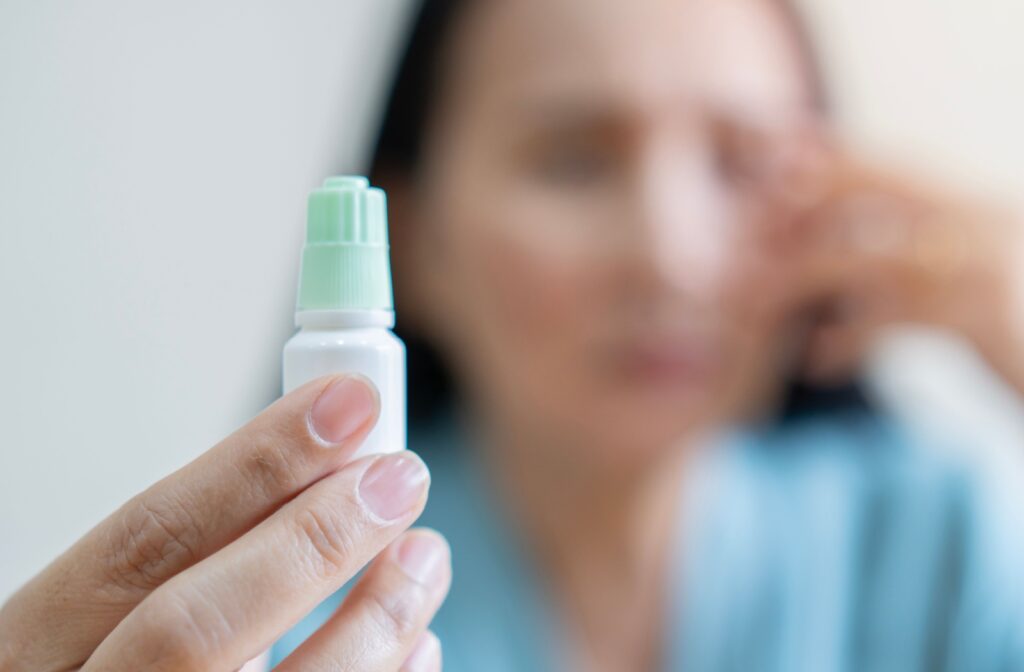They might be a go-to treatment for dryness, allergies, or eye infections, but how much do you really know about your eye drops?
These small bottles may seem straightforward, but they’re more delicate than you might think. While they play an important role in protecting your eye health and comfort, they only work as intended when they’re fresh and properly stored.
Yes, all eye drops expire. And using them past their shelf life doesn’t just reduce their effectiveness, it can increase your risk of irritation, infection, and other complications.
Eye Drops 101
Eye drops do more than soothe discomfort and irritation, they’re specially formulated liquids that deliver medication or hydration directly to the eye.
Though they may seem simple, eye drops are highly effective. They’re applied to the surface of the eye, spreading evenly to deliver active ingredients where they’re needed most.
But eye drops aren’t a one-size-fits-all solution. Different formulas are designed to target different eye concerns, including:
- Artificial tears: Often used to relieve dryness and irritation, these drops mimic natural tears to provide moisture. Preservative-free options are available for sensitive eyes or frequent use.
- Antihistamine eye drops: Designed to relieve allergy symptoms like redness, itching, and swelling by blocking histamine, a compound that triggers allergic reactions.
- Medicated eye drops: These prescription drops treat specific conditions, such as bacterial infections, inflammation, or glaucoma. It’s important to follow your optometrist’s dosage instructions closely when using medicated drops.
Because eye drops come in a variety of formulations, using the right type is key. For example, artificial tears can ease dry eye symptoms but won’t treat a bacterial infection.
That’s why it’s important to see your optometrist if you’re dealing with ongoing discomfort or irritation. A thorough eye exam can help determine the underlying cause and recommend the right type of drop for your needs.
This way, we’re not just masking symptoms, we’re addressing the problem at its source.
How to Tell If It’s Time to Replace Your Eye Drops
Fortunately, eye drop expiration dates are printed directly on the box and bottle, usually near the bottom or along the side. Checking this date helps reduce the risk of using expired drops.
You’ll typically find the expiration labeled as “EXP” followed by the month and year. Make it a habit to check this date each time you open a new bottle. Most eye drops also include information about how long the solution remains effective after opening, so be sure to review that as well.
Beyond the printed date, changes in the drop’s appearance or smell can signal it’s no longer safe to use. If the liquid becomes cloudy, changes colour, or develops an unusual odour, discard it immediately. These are clear signs that the solution may have degraded or become contaminated.
Why Do Eye Drops Expire?
No matter the type, all eye drops expire.
Over time, the active ingredients in eye drops can break down, making them less effective, especially if they’re medicated. Preservatives in the formula can also degrade, increasing the risk of contamination.
Once you open a bottle, its sterility is compromised. Each use creates an opportunity for bacteria or other particles to enter the container. While preservatives help keep the solution sterile, they’re only effective for a limited time.
The shelf life of an eye drop product depends on its formulation. As a general guideline:
- Unopened eye drops: These can remain safe and effective for several years when stored properly and used before their printed expiration date.
- Opened eye drops with preservatives: These should be discarded 28–30 days after opening to reduce the risk of contamination. Always check the manufacturer’s instructions, as the timeline can vary by brand.
- Preservative-free, single-use vials: These should be discarded immediately after each use, since they lack ingredients to maintain sterility once opened.
- Medicated eye drops: These typically expire around 28 days after opening. Following the prescribed schedule is essential to look out for effectiveness and safety.
Using expired eye drops can be more than just ineffective, it can be unsafe.
While an occasional use of expired drops might not cause harm, repeated use can expose your eyes to harmful bacteria and increase your risk of irritation or infection.
If you notice any changes in your vision or comfort after using expired drops, visit your optometrist as soon as possible and bring the eye drops with you, if you can.

How to Store & Handle Eye Drops Safely
Once opened, eye drops can become a breeding ground for bacteria. While proper care and storage won’t extend their shelf life, it can help maintain the drops’ effectiveness and reduce the risk of contamination.
- Store in a cool, dry place: Extreme temperatures can degrade the solution. Keep your eye drops at room temperature, away from direct sunlight and moisture.
- Tightly close the cap: Keeping the cap sealed tightly after each use helps protect the solution from contaminants. (This doesn’t apply to single-use, preservative-free vials, which should be discarded after one use.)
- Avoid touching the dropper tip: Be careful not to touch the tip of the dropper with your fingers, eyes, or any surface. This helps maintain sterility and prevent contamination.
Protect Your Eye Health
At Rancho Santa Margarita Optometry, we’re here to help you protect and preserve your vision, starting with the right eye care tools, like safe and effective eye drops. Whether you’re managing dry eye, allergies, or a medical condition, our team can guide you toward the right treatment.
If you’re unsure which drops are right for you or think it’s time for a fresh prescription, we’re just a visit away. Book an eye exam with our team today and take the next step in caring for your eyes with confidence.


